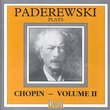| All Artists: Adelina Patti Title: Adelina Patti 1843-1919 Members Wishing: 0 Total Copies: 0 Label: Pearl Release Date: 12/23/1992 Genres: Special Interest, Pop, Classical Styles: Vocal Pop, Opera & Classical Vocal, Historical Periods, Baroque (c.1600-1750), Classical (c.1770-1830), Modern, 20th, & 21st Century Number of Discs: 1 SwapaCD Credits: 1 UPC: 727031931225 |
Search - Adelina Patti :: Adelina Patti 1843-1919
 | Adelina Patti Adelina Patti 1843-1919 Genres: Special Interest, Pop, Classical
|
Larger Image |
CD DetailsSimilar CDs
|
CD ReviewsA whisper from the past 09/16/2003 (5 out of 5 stars) "I had read about Adelina Patti for years, then one year I was able to find a record set of 2 records containing her recordings. I listened to it with much interest. Out of the mist and dark, the crackles and spits, came forth a wonderful voice beautifully produced even if past its prime. The portamento style was completely strange to me, and at first it sort of sounded sloppy, but on repeated listening, I learned to accept its stylistic relevance. Well, now those same recordings (even if not quite complete as the former set I had) are out there to listen to again. The remastering is a revelation. Yes, there is surface noise, so those who can't hear past that, I would NOT recommend you buy this recording. You are NOT going to hear any flights of coloratura to take your breath away (such singing Adelina was noted for, and did well); remember, the woman was OLD when these recordings were made, and had been retired a while. Yet, even making them thrilled her, for at first hearing she screamed out "Now I know why I am Patti." Patti was of a long ago generation that now is nothing more than a mention in the ancient history books. However, she was one singer who not only reflected the tastes of her time, but actually knew most of the composers of the music she sang. When listening to this set, one wonders, "Was that how Gounod taught her to sing the role?" The composers she sang approved of the portamento, the extremely smooth legato, and the mellow quality of her voice. We can never know for sure, but we are led to wonder just what in her singing style is a reflection of the composer's intent. Even with age, and with a less than perfect support, Patti is able to captivate us with her charm, her personality, and yes, her singing. People have commented on how she sounds more mezzo than soprano, and that is a reflection of the way singers sang at that time. Voices were trained with a strong full lower and middle register; high notes as we are used to hearing them were not considered appealing, though at the time of these recordings they were becoming more and more acceptable. High notes were not necessarily weak, but the volume we associate with them today simply was seen as tasteless. The voice was full at the bottom, and gradually lightened, yet still very penitrating. Thus, the rich sound we hear in Patti's singing (for alas, we hear no high notes at all) was probably the natural heart of her voice throughout her career. The caressing sweet high notes she was praised for would most likely have had that same richness along with a more brilliant focus. This is all technical, and maybe not too interesting, but it helps the buyer have an idea of what they are going to listen to. One thing I have to comment on, and that is Patti's trill. In all recording I doubt there has been a more beautiful trill recorded. It is even, warm, and so perfect. Sutherland's comes close in mellow beauty, but most sopranos, though perfectly executed, seem to have none of Patti's warmth in their trills (Melba's was technically perfect, but compared to Patti is cold and lifeless). Even Ponselle's, in all its stunning volume and briliance, has nothing on Patti. This is not a recording for everyone, and to some hearing things like "Old folks at home" may see like a cheap shot considering Patti's greatness in an era of super great singers. Again, the woman was old, and she recorded what she could (and even a few things she couldn't do) and left us with a glimpse, even if ever so clouded, of the wonderful joys of singing audiences of the past basked in regularly." Hers is a voice in its final bloom David Fletcher Noble | Highlands Ranch, CO United States | 08/17/2003 (4 out of 5 stars) "I heard that Adelina Patti's voice was a delight to hear. If only the gramphone would have been invented earlier than 1888 so I could have heard her voice in its prime. The charm and fullness of her vocal technique seems to have survived alright into the time of the recording, though she sounds more mezzo than soprano. She tends to slide a bit in Lotti's "Pur de cesti". The Mozart aria "Voi che sapete" had a little too much pace in the "Sospiro gemo" part, which kind of threw her off count. But I give her credit for the work she did in recording these songs. They can also paint pictures of Victorian and Romantic delights and transport the listener to the garden of past singers where Patti's voice was in its final flowing."
|

 Track Listings (22) - Disc #1
Track Listings (22) - Disc #1

